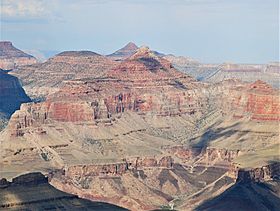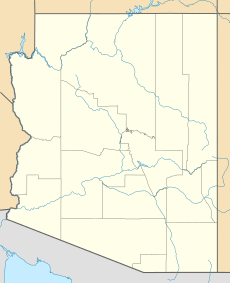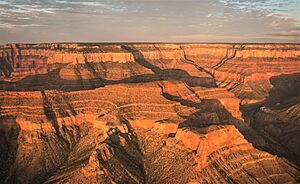Juno Temple (Grand Canyon) facts for kids
Quick facts for kids Juno Temple(Grand Canyon) |
|
|---|---|

Jupiter Temple (center) and lower elevation, black-topped ridgeline (left) of Juno Temple
|
|
| Highest point | |
| Elevation | 6,896 ft (2,102 m) |
| Prominence | 396 ft (121 m) |
| Isolation | 1.08 mi (1.74 km) |
| Parent peak | Jupiter Temple |
| Geography | |
| Location | Grand Canyon National Park Coconino County, Arizona, US |
| Parent range | Kaibab Plateau (Walhalla Plateau) Colorado Plateau |
| Topo map | USGS Walhalla Plateau |
| Geology | |
| Age of rock | Pennsylvanian down to Cambrian |
| Mountain type | sedimentary rock: sandstone-(prominence-cliff),siltstone, mudstone, sandstone, shale |
| Type of rock | Supai Group, Redwall Limestone, Muav Limestone, Bright Angel Shale |
| Climbing | |
| First ascent | September 3, 1961 Harvey Butchart |
Juno Temple is a mountain peak located in the amazing Grand Canyon in Arizona, United States. It stands tall at 6,896 feet (about 2,102 meters) above sea level. This peak is found in the eastern part of the Grand Canyon, within Coconino County.
Juno Temple is about 1.5 miles east of a viewpoint called Cape Final. It's also about 1 mile north of its closest tall neighbor, Jupiter Temple. The peak is roughly 3.5 miles away from the famous Colorado River. Water from Basalt Creek and Canyon flows from its eastern side.
What Makes Juno Temple Special?
Juno Temple looks different from its neighbor, Jupiter Temple. Jupiter Temple has a top made of light-colored Coconino Sandstone. But Juno Temple is mostly made of eroded Supai Group rocks. These rocks are often a bright orange-red, but at Juno Temple, they are stained a darker color. This gives the peak a unique look in the canyon.
Exploring Juno Temple
Climbing mountains in the Grand Canyon can be very challenging. The first person known to reach the top of Juno Temple was Harvey Butchart. He made this exciting first ascent on September 3, 1961. This shows how difficult and rewarding exploring the Grand Canyon can be.
 | Selma Burke |
 | Pauline Powell Burns |
 | Frederick J. Brown |
 | Robert Blackburn |




